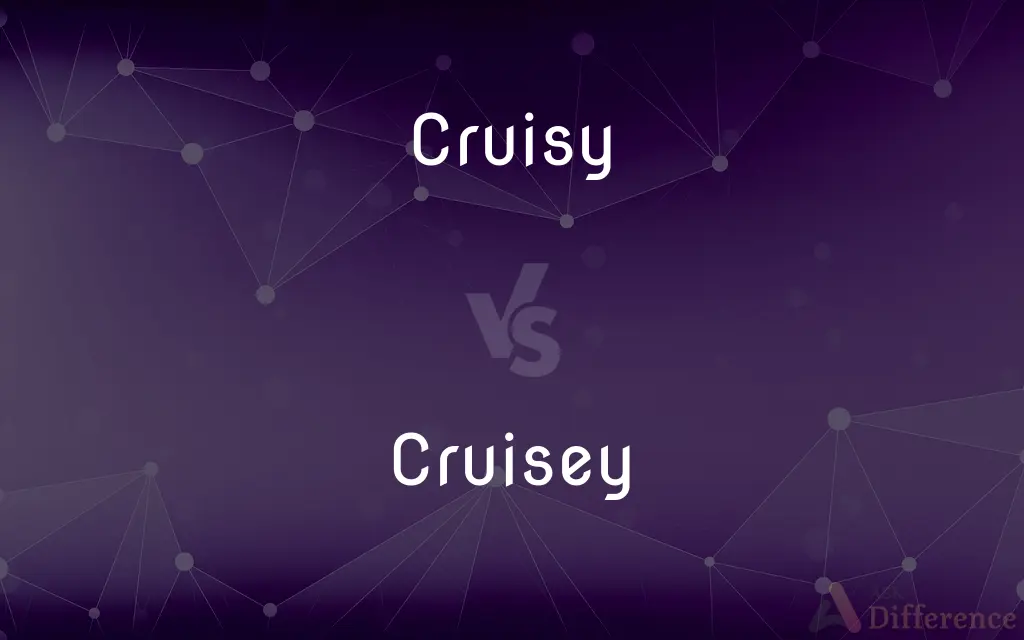Cruisy vs. Cruisey — What's the Difference?
Edited by Tayyaba Rehman — By Fiza Rafique — Updated on April 22, 2024
"Cruisy" often implies a relaxed atmosphere or easily navigable situation, whereas "cruisey" is a less common variant spelling of the same concept.

Difference Between Cruisy and Cruisey
Table of Contents
ADVERTISEMENT
Key Differences
"Cruisy" describes an environment or situation that is laid-back and devoid of stress, making it easy to navigate socially or physically. On the other hand, "cruisey" serves as an alternative spelling but carries the same meaning and usage in informal contexts.
In usage, "cruisy" is more commonly seen in written and spoken American English to describe effortless or untroubled scenarios. Meanwhile, "cruisey" might appear occasionally, but it is significantly less prevalent and might be considered a stylistic variant by some users.
When referring to specific places, like bars or vacation spots, "cruisy" can denote areas known for casual social interactions. Whereas "cruisey," despite its identical meaning, is less likely to be understood immediately due to its rarity in usage.
In terms of phonetic representation, both "cruisy" and "cruisey" are pronounced similarly, which might contribute to the interchangeable use in casual conversation, though "cruisy" remains the standard form.
Linguistically, the acceptance of "cruisy" over "cruisey" illustrates a broader pattern in English where certain spellings become standardized despite numerous variations existing in colloquial use.
ADVERTISEMENT
Comparison Chart
Spelling Variants
Standard spelling
Less common variant
Usage Frequency
Commonly used
Rarely used
Context of Use
Informal, descriptive
Informal, descriptive
Recognition in Dictionaries
Often recognized
Seldom recognized
Pronunciation
/ˈkruːzi/
/ˈkruːzi/
Compare with Definitions
Cruisy
Navigable with ease.
The new software is surprisingly cruisy to use.
Cruisey
Easygoing social atmosphere.
The local bar is cruisey and welcoming.
Cruisy
Informal and comfortable.
We enjoyed a cruisy conversation over dinner.
Cruisey
Informal and comfortable.
The meeting was unexpectedly cruisey.
Cruisy
Free from trouble or difficulty.
His cruisy demeanor makes him very approachable.
Cruisey
Navigable with ease.
She found the instructions quite cruisey to follow.
Cruisy
Easygoing social atmosphere.
That new café is quite cruisy; it’s perfect for a lazy afternoon.
Cruisey
Relaxed and unhurried.
The park on weekends feels very cruisey.
Cruisy
Relaxed and unhurried.
The beach has a cruisy vibe during the summer evenings.
Cruisey
Free from trouble or difficulty.
They promised a cruisey setup process for the equipment.
Cruisy
Relaxed or easy-going
I spent three cruisy days with my folks
Cruisey
Alternative spelling of cruisy
Cruisy
(of music) Suitable to listen to when driving leisurely.
Cruisy
Leisurely.
Common Curiosities
What is the origin of the word "cruisy"?
"Cruisy" likely evolved from the adjective "cruise," related to the verb form meaning to sail about leisurely or travel without a fixed destination.
Can "cruisy" describe a person’s personality?
Yes, describing someone as "cruisy" suggests they have a relaxed and easygoing personality.
Are there any synonyms for "cruisy"?
Yes, synonyms include "laid-back," "easygoing," and "relaxed."
Is the usage of "cruisey" region-specific?
"Cruisey" may appear more frequently in certain dialects or regional variants of English, but it is generally less common overall.
How can I tell if "cruisey" is appropriate to use in my writing?
Consider your audience and the formality of the context; "cruisey" is best used in informal settings among speakers familiar with this variant.
Do dictionaries recognize "cruisey" as a valid word?
Some dictionaries might list "cruisey" as a variant spelling, but it is less commonly recognized than "cruisy."
Is "cruisey" used in professional writing?
"Cruisey" is typically not used in professional writing due to its informal tone and less common spelling.
Is "cruisey" gaining popularity in modern language?
There's no significant evidence that "cruisey" is gaining popularity; "cruisy" remains the more standard usage.
Does the spelling of "cruisey" affect its comprehension?
The variant spelling "cruisey" may cause slight confusion but is generally understood among English speakers familiar with "cruisy."
What contexts are appropriate for using the word "cruisy"?
"Cruisy" is appropriate in casual, informal conversations or writing when describing a relaxed or easygoing atmosphere.
Can "cruisy" and "cruisey" be used in formal documents?
It is not recommended to use "cruisy" or "cruisey" in formal documents due to their informal nature.
Are there any notable publications that have featured the term "cruisy"?
While specific notable publications are hard to pinpoint, "cruisy" may appear in travel, lifestyle, or cultural articles focusing on relaxed themes.
What impact does cultural context have on the understanding of "cruisy"?
Cultural context can influence how well the term is understood, with "cruisy" possibly being more recognizable in cultures closely linked to English slang.
How do younger generations use "cruisy"?
Younger generations might use "cruisy" colloquially to describe anything that is uncomplicated or relaxed.
How do online platforms treat the word "cruisy"?
Online platforms and social media may feature "cruisy" in posts describing relaxed settings or experiences, reflecting its casual tone.
Share Your Discovery

Previous Comparison
Noble vs. Ignoble
Next Comparison
Manual vs. HandbookAuthor Spotlight
Written by
Fiza RafiqueFiza Rafique is a skilled content writer at AskDifference.com, where she meticulously refines and enhances written pieces. Drawing from her vast editorial expertise, Fiza ensures clarity, accuracy, and precision in every article. Passionate about language, she continually seeks to elevate the quality of content for readers worldwide.
Edited by
Tayyaba RehmanTayyaba Rehman is a distinguished writer, currently serving as a primary contributor to askdifference.com. As a researcher in semantics and etymology, Tayyaba's passion for the complexity of languages and their distinctions has found a perfect home on the platform. Tayyaba delves into the intricacies of language, distinguishing between commonly confused words and phrases, thereby providing clarity for readers worldwide.
















































